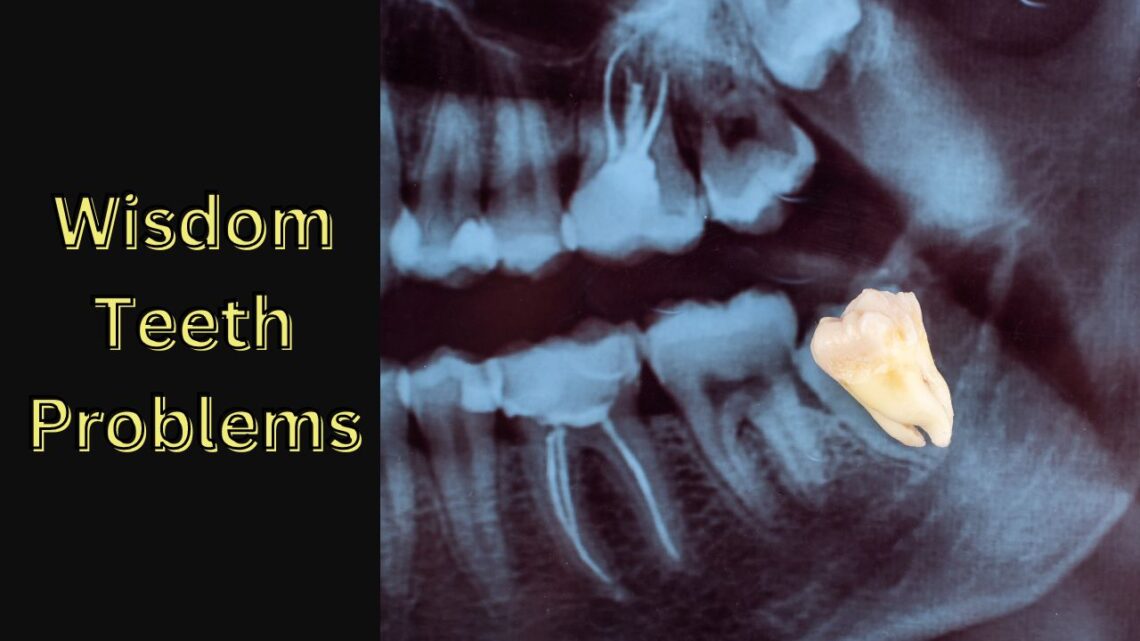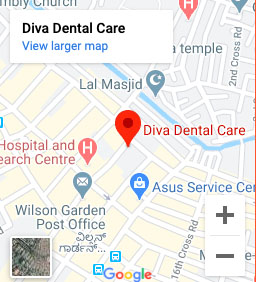Wisdom Teeth Problems
May 23, 2023
What are wisdom teeth and their problems?
Wisdom Teeth Problems - The final set of teeth that erupt in the adult dentition are the wisdom teeth, also referred to as third molars. The majority of people have four wisdom teeth, two in the upper jaw (maxillary) and two in the lower jaw (mandibular), one in each corner of the mouth. Wisdom teeth are those that normally appear in the late teens or early twenties.
Wisdom teeth can cause various dental problems due to several reasons:
1- Lack of Space: The human jaw has evolved over time, and as a result, many people do not have enough space in their mouths to accommodate the wisdom teeth properly. This lack of space can lead to a variety of issues.
2- Impaction: When there isn't enough space for the wisdom teeth to fully erupt, they may become impacted. Impacted wisdom teeth are unable to emerge fully from the gums and may be trapped in the jawbone or grow at an angle.
3- Crowding: Wisdom teeth can push against the neighboring teeth, causing crowding or misalignment of the existing teeth.
4- Infection and Gum Disease: Partially erupted wisdom teeth can create a flap of gum tissue around them, making it difficult to clean the area properly. This can result in the accumulation of bacteria and food debris, leading to infection and gum disease.
5- Decay and Cavities: Wisdom teeth are located at the back of the mouth, which makes them harder to clean effectively. The difficulty in reaching these teeth with a toothbrush and floss can increase the risk of tooth decay and cavities.
What happens if you have a decaying wisdom tooth?
If you have a decaying wisdom tooth, it can lead to several complications and oral health problems. Here are some of the potential consequences of a decaying wisdom tooth:
1- Pain and Discomfort: Tooth decay typically causes pain and discomfort, especially when the decay reaches the inner layers of the tooth where the nerves are located. This can result in persistent toothaches and sensitivity.
2- Infection: Decaying wisdom teeth can become a breeding ground for bacteria, leading to an infection in the surrounding tissues. The infection can manifest as swelling, redness, and pus formation around the affected tooth, known as a dental abscess.
3- Gum Disease: Tooth decay can also affect the gum tissues around the wisdom tooth. Bacteria from the decay can spread to the gums, leading to gum disease (gingivitis or periodontitis). Symptoms of gum disease include redness, swelling, bleeding gums, and bad breath.
4- Damage to Adjacent Teeth: Wisdom teeth are located at the back of the mouth and can exert pressure on the neighboring teeth as they decay or shift position. This pressure can lead to misalignment, crowding, or damage to adjacent teeth.
5- Cyst Formation: In some cases, a decaying wisdom tooth can develop a cyst, which is a fluid-filled sac. The cyst can cause damage to the jawbone, nearby teeth, and nerves, resulting in more significant complications.
6- Sinus Problems: An upper wisdom tooth with severe decay or infection can extend into the sinus cavity above it. This can cause sinus pain, pressure, congestion, and sinus infections.
Is there a chance of wisdom teeth causing a TMJ problem?
Yes, there is a chance that wisdom teeth can cause temporomandibular joint (TMJ) problems. The temporomandibular joint connects the jawbone to the skull and allows for the opening and closing of the mouth. When the TMJ is not functioning correctly, it can cause a range of problems, including pain, clicking or popping noises when opening or closing the mouth, difficulty opening the mouth, and even lockjaw.
1- Wisdom teeth can contribute to TMJ problems in a few ways. Here are some possible scenarios:
2- Overcrowding: If there is not enough room in the mouth for the wisdom teeth, they may push against the other teeth, causing crowding and misalignment. This can affect the bite and the position of the jaw, leading to TMJ issues.
3- Impaction: If the wisdom teeth are impacted, meaning they are not able to emerge fully from the gums, they can put pressure on the surrounding teeth and jawbone. This can also cause TMJ problems.
4- Teeth Grinding (Bruxism): Some people may unconsciously grind their teeth due to discomfort or irritation caused by the wisdom teeth. Teeth grinding can put a strain on the TMJ and exacerbate TMJ problems.
5- Infection and Inflammation: If a wisdom tooth is decayed or infected, it can cause inflammation in the surrounding tissues and jawbone. This can also affect the TMJ, causing pain and discomfort.
Is it worth it to remove wisdom teeth?
The decision to remove wisdom teeth depends on various factors, including the individual's oral health, the position and development of the wisdom teeth, and the potential risks and complications associated with keeping them. It's worth noting that not everyone needs to have their wisdom teeth removed. If the wisdom teeth are healthy, fully erupted, properly positioned, and not causing any problems, they may not require extraction. Regular dental check-ups and monitoring of the wisdom teeth's condition are crucial to identify any potential issues early on. Ultimately, the decision to remove wisdom teeth is best made in consultation with a dental professional who can evaluate your specific circumstances, discuss the pros and cons, and provide personalized recommendations based on your oral health and individual needs.
What are the risks of wisdom teeth removal?
While wisdom teeth removal is a common dental procedure with a high success rate, there are some potential risks and complications associated with it. Here are some possible risks of wisdom teeth removal:
1- Pain and Swelling: Pain and swelling are common after wisdom teeth removal. However, these symptoms are usually temporary and can be managed with pain medications and cold compresses.
2- Infection: There is a risk of infection after wisdom teeth extraction, although it is relatively low. Following post-operative instructions, such as maintaining oral hygiene and taking prescribed antibiotics, can help minimize the risk.
3- Dry Socket: Dry socket, also known as alveolar osteitis, is a condition where the blood clot that forms in the extraction site is dislodged or dissolves prematurely. This can result in intense pain and delayed healing.
4- Nerve Damage: The extraction of wisdom teeth in close proximity to the nerves in the jawbone can rarely cause temporary or permanent nerve damage. This can result in numbness, altered sensation, or tingling in the lips, tongue, or chin.
5- Sinus Complications: Upper wisdom teeth in close proximity to the sinuses can occasionally result in sinus complications after extraction. This may include sinus infections, sinus pain, or the communication of the extraction site with the sinus cavity.
6- Bleeding: Some bleeding is normal after wisdom teeth removal, but excessive or prolonged bleeding may occur in rare cases.
Why is a wisdom tooth so painful?
1- Impaction: Impacted wisdom teeth occur when there is not enough space in the jaw for the teeth to fully emerge or grow in the proper alignment. As a result, the wisdom tooth may become trapped beneath the gum line, pushing against other teeth or the jawbone. The pressure and crowding can lead to pain and discomfort.
2- Infection or Inflammation: If the wisdom tooth partially erupts through the gum tissue, a flap of gum can form around it, creating a pocket where bacteria and food particles can accumulate. This can lead to infection and inflammation of the surrounding gum tissue, known as pericoronitis. The infection can cause pain, swelling, and tenderness.
3- Decay and Cavities: Wisdom teeth are located at the back of the mouth, making them more difficult to clean effectively. This can result in the buildup of plaque and bacteria, leading to tooth decay and cavities. Decay in the wisdom tooth can cause pain and sensitivity.
4- Erupting Teeth: As the wisdom teeth are pushing through the gums during their eruption process, it can cause discomfort and pain. The pressure exerted by the emerging tooth can irritate the surrounding tissues, leading to pain and soreness.
5- Tooth Abscess: If tooth decay or infection progresses without treatment, it can lead to the formation of an abscess, which is a pocket of pus in or around the tooth. An abscess can cause intense pain and swelling, as well as general discomfort and illness.
What are the disadvantages of removing wisdom teeth?
While wisdom teeth removal is a common dental procedure with numerous benefits, there are some potential disadvantages and drawbacks to consider. Here are a few disadvantages associated with wisdom teeth removal:
1- Surgical Risks: Wisdom teeth extraction is a surgical procedure that involves some risks. Although complications are relatively rare, there is always a small possibility of bleeding, infection, nerve injury, sinus complications (for upper wisdom teeth), or adverse reactions to anesthesia. Choosing an experienced oral surgeon and following post-operative instructions can help minimize these risks.
2- Recovery Period: After wisdom teeth removal, a recovery period is necessary. During this time, you may experience swelling, pain, discomfort, and difficulty eating certain foods. The length and intensity of the recovery period can vary, but it generally takes a few days to a week for most people to heal fully.
3- Cost: The cost of wisdom teeth removal can be a disadvantage for some individuals. The exact cost depends on various factors, including the complexity of the extraction, location, anesthesia type, and insurance coverage. It's essential to discuss the financial aspect with your dentist or oral surgeon beforehand.
4- Rare Complications: Although rare, complications can occur during or after wisdom teeth removal. These can include dry socket (delayed healing due to the loss of the blood clot in the extraction site), excessive bleeding, infection, damage to adjacent teeth or structures, or persistent pain. While these complications are not common, it's important to be aware of the possibility and promptly report any concerns to your dental professional.
5- Unnecessary Removal: Not all wisdom teeth require removal. If the teeth are healthy, fully erupted, properly positioned, and not causing any issues, extraction may not be necessary. However, regular monitoring and check-ups with a dental professional are necessary to ensure any potential problems are identified and addressed in a timely manner.
Is it normal for wisdom teeth to cause swelling in the gum?
Yes, it is not uncommon for wisdom teeth to cause swelling in the gum tissue. Swelling around the area of an erupting or impacted wisdom tooth is often a result of inflammation or infection. When a wisdom tooth is partially erupted or impacted, a flap of gum tissue may cover part of the tooth. This flap can create a pocket where bacteria and food particles can accumulate, leading to an infection or inflammation known as pericoronitis. The infection causes the gum tissue to become swollen, red, and tender. Swelling can also occur if there is decay or infection in the wisdom tooth itself, as the infection can spread to the surrounding gum tissue.
Wisdom Teeth Problems
It's important to weigh the potential disadvantages against the potential benefits and risks of keeping the wisdom teeth. Your dentist or oral surgeon can provide guidance based on your specific situation and help you make an informed decision.



